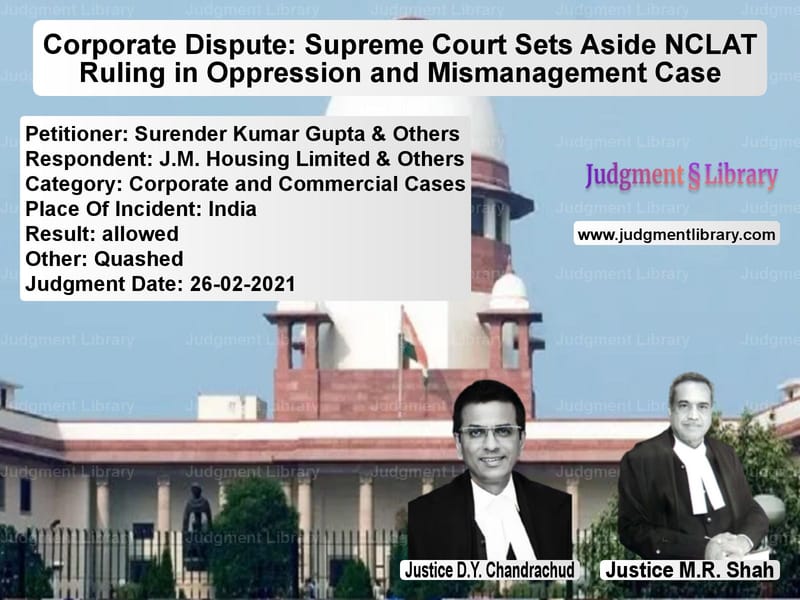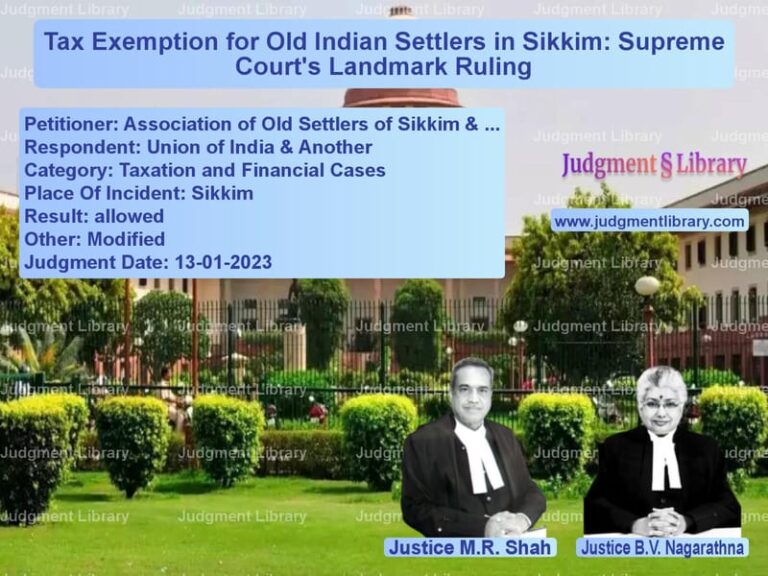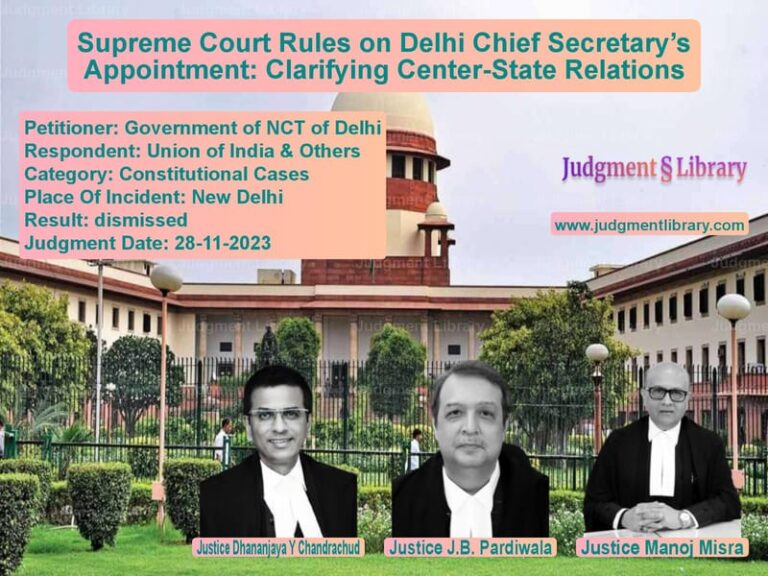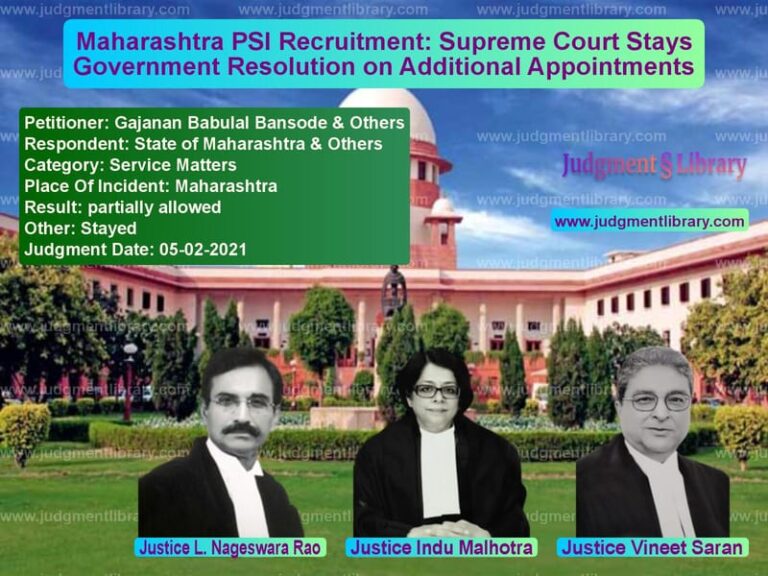Corporate Dispute: Supreme Court Sets Aside NCLAT Ruling in Oppression and Mismanagement Case
The Supreme Court of India recently adjudicated on a corporate dispute in the case of Surender Kumar Gupta & Others vs. J.M. Housing Limited & Others, addressing key legal questions related to oppression and mismanagement under the Companies Act, 2013. The Court set aside the National Company Law Appellate Tribunal (NCLAT) ruling, emphasizing proper procedural steps in dealing with ex-parte interim orders.
Background of the Case
The appellants, Surender Kumar Gupta and others, filed a petition under Sections 241 and 242 of the Companies Act, 2013, alleging oppression and mismanagement in J.M. Housing Limited. The National Company Law Tribunal (NCLT) issued an ex-parte order on October 5, 2020, granting interim relief to the petitioners. Instead of approaching the NCLT for modification or vacation of the order, the respondents (J.M. Housing Limited and others) directly moved the NCLAT.
On December 18, 2020, the NCLAT set aside the NCLT’s order on the ground that it violated principles of natural justice. The tribunal ruled that the respondents had not been given an opportunity to be heard before the ex-parte order was passed. The NCLAT then remanded the matter back to the NCLT for a fresh hearing.
Petitioner’s (Surender Kumar Gupta & Others) Arguments
The appellants raised the following arguments before the Supreme Court:
- The NCLAT erred in setting aside the ex-parte order solely on the ground of natural justice without considering whether the urgency of the matter justified such an order.
- The proper remedy for the respondents was to approach the NCLT for vacating or modifying the ex-parte order instead of filing a direct appeal before the NCLAT.
- The NCLAT made observations on the merits of the case, which prejudiced the appellants even before the matter was fully heard by the NCLT.
- Remanding the matter for a fresh hearing would delay the proceedings, depriving the appellants of necessary interim relief.
Respondent’s (J.M. Housing Limited) Arguments
The respondents countered with the following points:
- The ex-parte order of the NCLT was passed without giving them an opportunity to present their case, violating natural justice principles.
- The order should be set aside and the matter heard afresh so that both parties could present their arguments.
- The NCLAT correctly identified the procedural lapse and acted within its jurisdiction in remanding the matter to the NCLT.
Supreme Court’s Observations
The Supreme Court, comprising Justices D.Y. Chandrachud and M.R. Shah, examined the case and made the following key observations:
- The correct course of action for a party aggrieved by an ex-parte order is to approach the same forum that issued the order (NCLT in this case) and seek its modification or vacation.
- “The essence of an ex-parte order is that it is passed without hearing the other side, in a situation where the adjudicating authority is satisfied that a case involving grave urgency is made out.”
- Before granting an ex-parte order, the NCLT must consider whether irretrievable injury would be caused to the applicant if interim relief is not granted.
- The NCLAT failed to assess whether the NCLT had applied the correct legal tests in granting interim relief.
- Setting aside the NCLT’s order merely on the ground of a lack of hearing was incorrect.
- The principle set by the NCLAT was legally unsound and showed a lack of understanding of basic procedural laws.
The Supreme Court further observed:
“The principle which has been propounded by the NCLAT is rather novel to civil jurisprudence and betrays a lack of comprehension of basic legal principles.”
Final Judgment
The Supreme Court set aside the NCLAT’s order and replaced it with the following directions:
- The appellants (Surender Kumar Gupta & Others) are granted liberty to apply afresh before the NCLT for interim relief.
- The respondents (J.M. Housing Limited) may file their reply within two weeks.
- The NCLT must reconsider the interim relief application and decide it within four weeks from receiving the Supreme Court’s order.
- The Supreme Court clarified that it had not expressed any opinion on the merits of the case, which would be addressed by the NCLT.
Impact of the Judgment
This Supreme Court ruling has important legal implications:
- Clarification of Correct Legal Procedure: The judgment reinforces that an aggrieved party must first seek modification or vacation of an ex-parte order from the issuing forum before filing an appeal.
- Protection of Due Process: The decision ensures that courts and tribunals properly apply legal principles before setting aside orders on procedural grounds.
- Balance Between Urgency and Natural Justice: The ruling highlights that ex-parte orders must be justified based on urgency and irreparable harm, but also subject to review upon challenge.
- Efficient Case Management: The Supreme Court’s timeline for resolution (four weeks) ensures the case does not suffer unnecessary delays.
Conclusion
The Supreme Court’s decision in Surender Kumar Gupta & Others vs. J.M. Housing Limited & Others serves as an important precedent for corporate law cases involving oppression and mismanagement. The ruling ensures that ex-parte orders are issued only in cases of genuine urgency while safeguarding the rights of respondents by allowing them a fair opportunity to contest interim relief.
Read also: https://judgmentlibrary.com/supreme-court-clarifies-contempt-of-court-in-family-business-dispute/
This judgment reaffirms the importance of procedural discipline in company law disputes and prevents unnecessary appellate interference, ensuring that cases are handled efficiently within the designated judicial framework.
Petitioner Name: Surender Kumar Gupta & Others.Respondent Name: J.M. Housing Limited & Others.Judgment By: Justice D.Y. Chandrachud, Justice M.R. Shah.Place Of Incident: India.Judgment Date: 26-02-2021.
Don’t miss out on the full details! Download the complete judgment in PDF format below and gain valuable insights instantly!
Download Judgment: surender-kumar-gupta-vs-j.m.-housing-limited-supreme-court-of-india-judgment-dated-26-02-2021.pdf
Directly Download Judgment: Directly download this Judgment
See all petitions in Corporate Governance
See all petitions in Shareholder Disputes
See all petitions in unfair trade practices
See all petitions in Arbitration Act
See all petitions in Dispute Resolution Mechanisms
See all petitions in Judgment by Dhananjaya Y Chandrachud
See all petitions in Judgment by Mukeshkumar Rasikbhai Shah
See all petitions in allowed
See all petitions in Quashed
See all petitions in supreme court of India judgments February 2021
See all petitions in 2021 judgments
See all posts in Corporate and Commercial Cases Category
See all allowed petitions in Corporate and Commercial Cases Category
See all Dismissed petitions in Corporate and Commercial Cases Category
See all partially allowed petitions in Corporate and Commercial Cases Category







